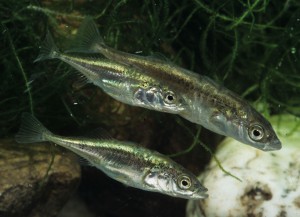Podcast: Play in new window
BOB HIRSHON (Host):
How sticklebacks stick together. I’m Bob Hirshon and this is Science Update.

In many social animal species, hanging out with close relatives can increase the family’s chances of survival. But if those relatives haven’t previously met, will they still group together? To find out, behavioral ecologist Joachim Frommen and his colleagues at the Konrad Lorenz Institute of Ethology in Vienna let small fish called sticklebacks choose to join either a group of siblings they’d never met before or a group of unrelated strangers. He says the fish usually chose to join their siblings. In another experiment, the fish got to choose between groups of familiar and unfamiliar siblings.
JOACHIM FROMMEN (Konrad Lorenz Institute of Ethology, Vienna):
It doesn’t matter whether fish are familiar to each other or not, if they’re related, they prefer each other.
HIRSHON:
Frommen, now at the University of Bern in Switzerland, says the fish probably recognize their kin by their unique scent.
FROMMEN:
Olfaction seems to be pretty crucial.
HIRSHON:
I’m Bob Hirshon, for AAAS, the science society.
